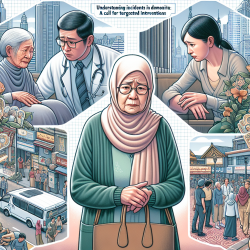Introduction
Adverse Childhood Experiences (ACEs) are significant risk factors for the development of severe mental disorders such as schizophrenia and bipolar disorder. A recent population-based study titled "Adverse childhood experiences and psychological functioning among women with schizophrenia or bipolar disorder" highlights the profound impact of ACEs on psychological functioning in women with these disorders. This blog aims to explore the study's findings and discuss how practitioners can utilize this information to enhance therapeutic outcomes for affected individuals.
Key Findings from the Study
The study analyzed data from 29,367 women, focusing on the prevalence and impact of ACEs among those diagnosed with schizophrenia or bipolar disorder. Key findings include:
- Women with severe mental disorders reported a higher number of ACEs compared to those without such disorders (mean 4.57 vs. 2.51).
- Specific ACEs, such as emotional abuse, sexual abuse, and mental illness of a household member, were strongly associated with these disorders.
- Among women with severe mental disorders, a higher number of ACEs correlated with increased symptoms of depression, anxiety, and poorer sleep quality.
Implications for Practitioners
Understanding the link between ACEs and severe mental disorders is crucial for practitioners aiming to improve therapeutic outcomes. Here are some strategies based on the study's findings:
- Incorporate Trauma-Focused Therapy: Given the strong association between ACEs and severe mental disorders, integrating trauma-focused psychotherapy can be beneficial. Techniques such as Eye Movement Desensitization and Reprocessing (EMDR) or Trauma-Focused Cognitive Behavioral Therapy (TF-CBT) can help address the underlying trauma.
- Comprehensive Assessment: Conduct thorough assessments to identify specific ACEs experienced by patients. This information can guide personalized treatment plans that address individual needs.
- Enhance Coping Strategies: Equip patients with effective coping mechanisms to manage symptoms of depression, anxiety, and sleep disturbances. Mindfulness practices and stress-reduction techniques can be valuable additions to therapy.
- Collaborative Care Approach: Collaborate with other healthcare providers, including psychiatrists and social workers, to ensure a holistic approach to treatment that addresses both psychological and social factors.
Encouraging Further Research
The study underscores the need for further research into the specific mechanisms through which ACEs impact psychological functioning. Practitioners are encouraged to contribute to this growing body of knowledge by conducting longitudinal studies and exploring the efficacy of different therapeutic interventions.
Conclusion
Adverse Childhood Experiences play a critical role in the development and progression of severe mental disorders in women. By understanding and addressing these experiences, practitioners can significantly enhance therapeutic outcomes. For those interested in delving deeper into the study's findings, the original research paper can be accessed here.










